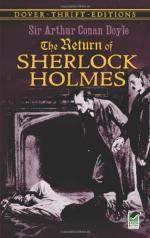Several times I had observed that Milverton looked at his watch, and once he had risen and sat down again, with a gesture of impatience. The idea, however, that he might have an appointment at so strange an hour never occurred to me until a faint sound reached my ears from the veranda outside. Milverton dropped his papers and sat rigid in his chair. The sound was repeated, and then there came a gentle tap at the door. Milverton rose and opened it.
“Well,” said he, curtly, “you are nearly half an hour late.”
So this was the explanation of the unlocked door and of the nocturnal vigil of Milverton. There was the gentle rustle of a woman’s dress. I had closed the slit between the curtains as Milverton’s face had turned in our direction, but now I ventured very carefully to open it once more. He had resumed his seat, the cigar still projecting at an insolent angle from the corner of his mouth. In front of him, in the full glare of the electric light, there stood a tall, slim, dark woman, a veil over her face, a mantle drawn round her chin. Her breath came quick and fast, and every inch of the lithe figure was quivering with strong emotion.
“Well,” said Milverton, “you made me lose a good night’s rest, my dear. I hope you’ll prove worth it. You couldn’t come any other time—eh?”
The woman shook her head.
“Well, if you couldn’t you couldn’t. If the Countess is a hard mistress, you have your chance to get level with her now. Bless the girl, what are you shivering about? That’s right. Pull yourself together. Now, let us get down to business.” He took a notebook from the drawer of his desk. “You say that you have five letters which compromise the Countess d’Albert. You want to sell them. I want to buy them. So far so good. It only remains to fix a price. I should want to inspect the letters, of course. If they are really good specimens—Great heavens, is it you?”
The woman, without a word, had raised her veil and dropped the mantle from her chin. It was a dark, handsome, clear-cut face which confronted Milverton—a face with a curved nose, strong, dark eyebrows shading hard, glittering eyes, and a straight, thin-lipped mouth set in a dangerous smile.
“It is I,” she said, “the woman whose life you have ruined.”
Milverton laughed, but fear vibrated in his voice. “You were so very obstinate,” said he. “Why did you drive me to such extremities? I assure you I wouldn’t hurt a fly of my own accord, but every man has his business, and what was I to do? I put the price well within your means. You would not pay.”
“So you sent the letters to my husband, and he—the noblest gentleman that ever lived, a man whose boots I was never worthy to lace—he broke his gallant heart and died. You remember that last night, when I came through that door, I begged and prayed you for mercy, and you laughed in my face as you are trying to laugh now, only your coward heart cannot keep your lips from twitching. Yes, you never thought to see me here again, but it was that night which taught me how I could meet you face to face, and alone. Well, Charles Milverton, what have you to say?”




